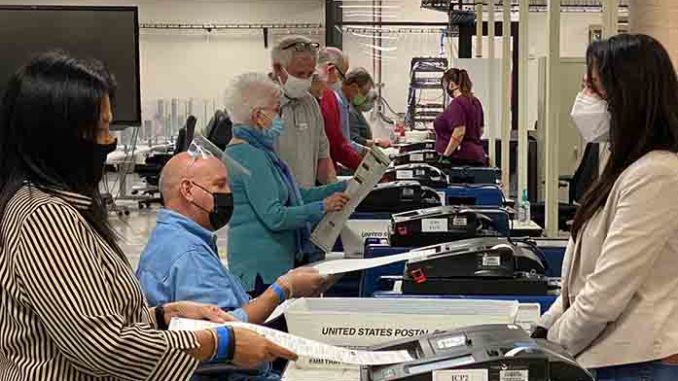
“Confidence in our elections system is paramount in our democracy,” Maricopa County Supervisor Bill Gates said Tuesday, although many voters aren’t feeling confident about the results announced from two forensic audits of the county’s electronic voting system.
According to Gates, the “clean audit results” reported by SLI Compliance and Pro V&V “debunk the many conspiracies” about tabulation machines being able to connect to the internet, about the machines switching votes, about malicious software and hardware present on the machines, and about source code changes during the election.
On Tuesday, the county’s election directors who work for the Board of Supervisors provided a two-page summary memo about the forensic audit results. The contract parameters called for the two companies to conduct separate forensic audits of the Dominion Voting System utilized by Maricopa County for the 2020 General Election. A third phase of the audit will look at the county’s procurement process.
The memo by election directors Scott Jarrett and Rey Valenzuela also explained why SLI Compliance and Pro V&V were selected, although the reason differs from what other county officials have said in the past.
“These are the only firms we believed possessed the knowledge and expertise to perform this very detailed and technical analysis to determine that the voting equipment and system were correctly configured and did not possess any vulnerabilities,” their memo states, although other officials previously insisted SLI Compliance and Pro V&V were the “only” companies certified to undertake such audits.
RELATED ARTICLE: When Is An Audit Of An Election Not An Election Audit?
The audits had four test objectives, including whether the installed software was certified by the Arizona Secretary of State and by the U.S. Election Assistance Commission (EAC) and whether a Logic & Accuracy Test could determine if vote “switching” occurred.
Vote switching is when a tabulation machine changes some votes from one candidate to another. The Pro V&V audit reported that its L&A test “resulted in accurate numbers” but SLI Compliance reported its staff was not asked to do a L&A Test.
The third test objective was to determine if any tabulator equipment was connected to the internet at any time, which could have been used to trigger malware. Pro V&V determined Maricopa County’s system is a “closed network” that does not have internet access. That finding matched the SLI Compliance report that “no evidence of an Internet Connection was identified.”
The remaining test objective, however, is likely to remain a point of contention for many voters who believe the Dominion system’s software was somehow manipulated.
According to SLI Compliance, “no malicious malware or hardware was detected” on the voting system or equipment. Pro V&V’s finding was that no malicious hardware or software discrepancies were identified.
Neither finding states emphatically that malicious malware was never on the system during days of ballot tabulation. Or that it simply might not be possible to detect any malware three months after the election.
Despite that less than emphatic pronouncement, Jarrett and Valenzuela reported to their bosses on the county board that the audit findings along with prior L&A tests, post-election hand counts, and “many security protocols implemented by the Elections Department” confirm that the county’s “configuration and setup of the tabulation equipment and election management system provided an accurate counting of ballots and reporting of election results.”
